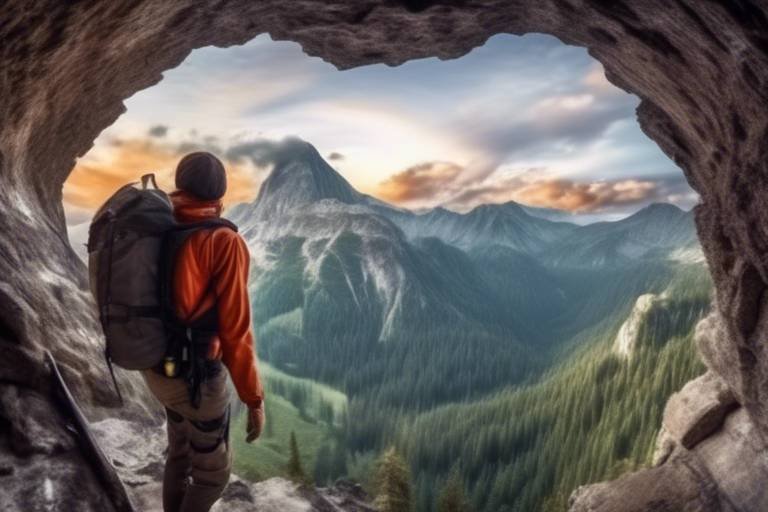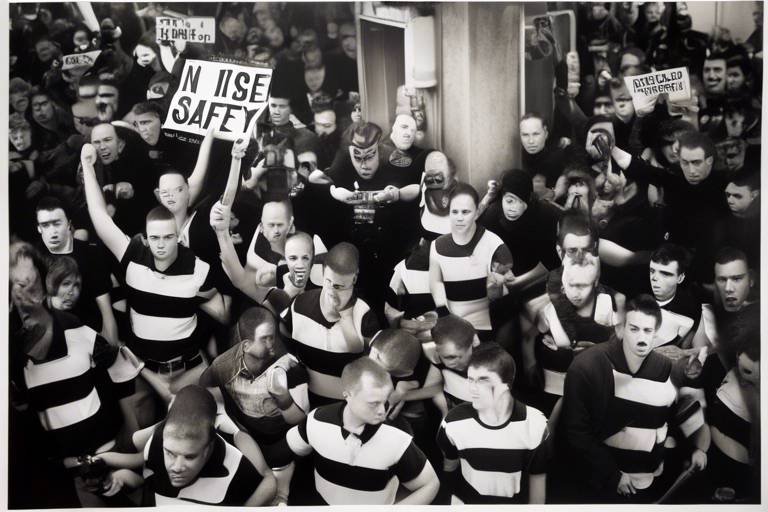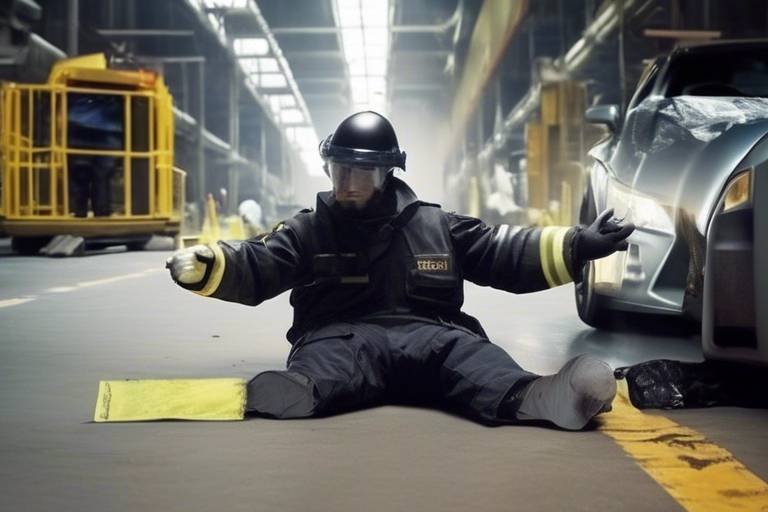Travel Safety Tips for Solo Adventurers
Traveling solo can be one of the most exhilarating experiences of your life. The freedom to explore new places at your own pace, meet new people, and immerse yourself in different cultures is absolutely thrilling. However, with great adventure comes great responsibility, and ensuring your safety while traveling alone is paramount. This article provides essential safety tips for those who choose to travel alone, covering various aspects from planning to on-the-ground strategies to ensure a secure and enjoyable adventure.
Understanding the local culture, customs, and safety concerns is crucial for solo travelers. Before you even pack your bags, take some time to delve into the intricacies of your destination. What are the local laws? Are there areas that are best avoided after dark? Knowledge is your best friend when it comes to travel safety. By doing thorough research, you can avoid potential pitfalls and enhance your travel experience. You might even discover hidden gems that you wouldn’t have known about otherwise! For instance, familiarize yourself with local phrases; even a simple 'hello' in the native language can open doors and create a sense of connection.
Maintaining communication with friends and family is vital for solo adventurers. In this digital age, staying connected is easier than ever. Make sure to share your itinerary with someone you trust and check in regularly. Whether it's through social media, texting, or video calls, keeping someone informed about your whereabouts can be a safety net. Additionally, consider downloading apps that allow you to share your location in real-time. This way, if anything goes awry, someone will know where to find you. Remember, it's not just about safety; it’s also about sharing the excitement of your journey with loved ones!
Keeping your valuables safe is paramount when traveling alone. Imagine this: you’re in a bustling market, the vibrant colors and sounds are captivating, but so are the pickpockets. To avoid theft, invest in anti-theft bags or money belts that can be worn under your clothes. Always be mindful of your surroundings and keep your belongings close. When in a café or restaurant, don’t hang your bag on the chair—keep it on your lap or secured to the table. Also, consider making copies of important documents like your passport and storing them separately from the originals. This way, if something does go missing, you have a backup plan.
Listening to your intuition can be a lifesaver for solo travelers. Sometimes, your gut feeling can sense danger before your mind processes it. If something feels off, it probably is. Don’t hesitate to leave a situation or change your plans if you feel uncomfortable. It's like that little voice inside you that whispers, "Hey, maybe this isn't the best idea." Trusting your instincts can help you navigate unfamiliar situations and make safer choices. Remember, it’s better to be safe than sorry!
Selecting the right place to stay can significantly impact your safety. When searching for accommodations, opt for well-reviewed hotels or hostels that have a reputation for safety. Look for places with 24-hour reception and good security measures. If you're using platforms like Airbnb, read the reviews thoroughly. A cozy room can be inviting, but if the neighborhood feels sketchy, it’s worth considering other options. Don’t be afraid to reach out to the host with questions about safety and local tips. After all, a good night’s sleep is essential for a successful adventure!
Staying alert and aware of your environment is crucial for solo travelers. When you're in a new place, it’s easy to get lost in the sights, but keeping an eye on your surroundings can help you avoid potential dangers. Make it a habit to glance around every so often and observe the people and activities around you. If you’re using your phone for navigation, try to do it discreetly to avoid drawing attention to yourself. Being aware doesn’t mean you can’t enjoy your adventure; it simply means you’re taking proactive steps to ensure your safety while soaking in all the beauty around you.
Connecting with fellow travelers can enhance your journey and provide safety in numbers. Whether it’s through group tours, hostels, or social media platforms, meeting other adventurers can be a fantastic way to share experiences and tips. Plus, having a travel buddy can make exploring new places feel less daunting. Consider joining local meetups or travel groups to expand your network. Who knows? You might find a new friend for life or even a travel companion for the rest of your journey!
Choosing safe and reliable transportation options is essential for solo travel. Research public transport systems in your destination and familiarize yourself with the routes. If you plan to use rideshare services, confirm the driver’s identity before getting in. Always opt for licensed taxis or reputable transport services. It’s also wise to have a backup plan in case your primary mode of transport falls through. Whether it’s a map of the area or a list of local taxi services, being prepared can save you from unnecessary stress.
Being prepared for emergencies is vital for solo adventurers. Before you embark on your journey, take the time to note down local emergency contacts, including police, medical services, and your country’s embassy. Keep this information easily accessible, perhaps in your phone or a small notebook. Additionally, familiarize yourself with the local healthcare system. Knowing where to go in case of an emergency can make all the difference. Remember, it’s always better to be over-prepared than under-prepared!
- What should I do if I feel unsafe? Trust your instincts and remove yourself from the situation. Seek help from locals or authorities if necessary.
- How can I meet other solo travelers? Join group tours, stay in hostels, or use social media platforms to connect with other travelers.
- Are there specific apps for solo travelers? Yes! Apps like Couchsurfing, Meetup, and Travel Buddy can help you connect with others.
- What should I pack for safety? Consider packing a whistle, a portable charger, and a first aid kit. These can come in handy in emergencies.

Research Your Destination
When it comes to solo travel, doing your homework is essential. Imagine stepping into a new country without knowing its customs, culture, or even the basic language. It can feel like diving into the deep end of a pool without knowing how to swim! To avoid potential pitfalls and enhance your travel experience, you must thoroughly research your destination before you even pack your bags. Start by exploring the local culture—what are the traditions, the social norms, and the etiquette? Understanding these aspects can help you avoid embarrassing situations and foster positive interactions with locals.
Additionally, it’s crucial to familiarize yourself with any safety concerns specific to your destination. For instance, are there areas best avoided after dark? Are there common scams targeting tourists? Websites, travel blogs, and forums like TripAdvisor can provide invaluable insights. You might even stumble upon hidden gems that typical tourist guides overlook. By gathering as much information as possible, you’re not just preparing for a trip; you’re crafting an adventure that aligns with your interests and safety.
Another effective way to prepare is by learning a few key phrases in the local language. While you don’t need to become fluent, knowing how to say “hello,” “thank you,” and “help!” can make a world of difference. It shows respect for the local culture and can help you navigate tricky situations. Think of it as having a secret weapon in your travel arsenal!
To make your research more organized, consider creating a destination checklist. This can include:
- Local customs and etiquette
- Safety tips and areas to avoid
- Basic language phrases
- Must-see attractions
- Emergency contacts and resources
Finally, don’t forget to check the current travel advisories from your government or trusted travel organizations. These advisories can provide crucial information regarding health risks, political situations, and natural disasters that might affect your trip. By being well-informed, you’re not just a tourist; you’re a savvy traveler ready to embrace the world!

Stay Connected
When you're off on your solo adventure, staying connected is not just a luxury; it's a necessity. Imagine wandering through the vibrant streets of a new city, feeling the thrill of exploration, but also the twinge of isolation. The world can feel vast and intimidating when you're alone. However, by keeping in touch with friends and family back home, you can transform that feeling of solitude into a sense of security. So, how can you ensure that you remain connected while you’re globetrotting?
First and foremost, consider investing in a local SIM card or an international data plan. This way, you’ll have access to mobile data wherever you go, allowing you to share your experiences in real-time and access maps or emergency contacts at the drop of a hat. With a reliable internet connection, you can easily keep your loved ones updated on your whereabouts. Just think of it as having a lifeline to home, making your adventures feel less daunting.
Another great option is to use messaging apps like WhatsApp, Facebook Messenger, or Viber. These platforms allow you to send texts, make calls, and even share photos without incurring hefty international roaming charges. Plus, they often come with features like end-to-end encryption, ensuring that your conversations remain private. Imagine sending a quick selfie from a stunning viewpoint, instantly sharing your joy with friends or family. It’s like having them right there with you, experiencing the thrill of your journey.
But it’s not just about staying in touch with those back home. Connecting with other travelers can also enhance your experience. Many solo adventurers find camaraderie in hostels, group tours, or local meetups. You can share stories, tips, and even travel plans with like-minded individuals. Engaging with other travelers not only provides you with a support network but also opens the door to new friendships and experiences. After all, who wouldn’t want to swap stories over a cup of coffee with someone who’s just as passionate about exploration?
To ensure that you’re always reachable, consider sharing your itinerary with someone you trust. This could be a friend or a family member who can keep tabs on your journey. You might even want to schedule regular check-ins, whether it’s a quick text or a video call. It’s like having a safety net, knowing that someone is aware of your plans and can act if something goes awry.
Lastly, don't forget about the power of social media. Platforms like Instagram or Twitter allow you to share snippets of your adventure with a wider audience. Not only does this keep your friends and family in the loop, but it can also serve as a digital diary of your travels. Just remember to adjust your privacy settings to ensure that only those you trust can see your posts. This way, you can enjoy your adventures while still being mindful of your safety.
In summary, staying connected while traveling solo is all about leveraging technology to create a safety net. Whether it’s through a local SIM card, messaging apps, or social media, maintaining communication with loved ones and fellow travelers can enhance your adventure and provide peace of mind. So, as you embark on your journey, remember that the world is a little less intimidating when you know you’re just a message away from home.
- How can I stay connected without a local SIM card? You can rely on Wi-Fi in cafes, hotels, and public spaces. Apps like Skype or Zoom can help you make calls over Wi-Fi.
- What should I do if I lose my phone while traveling? Immediately contact your service provider to suspend your service and use another device to inform your emergency contacts.
- Are there any safety concerns with using public Wi-Fi? Yes, public Wi-Fi can be insecure. Always use a VPN to protect your data when connecting to public networks.

Secure Your Belongings
When you're on the road, especially as a solo adventurer, your belongings can feel like your lifeline. Losing your passport, money, or electronics can turn a dream trip into a nightmare faster than you can say "lost luggage." That's why it's crucial to and keep them safe from theft or loss. Think of your valuables as precious gems; you wouldn’t leave them lying around for anyone to grab, right? So, let’s dive into some practical strategies that can help you keep your stuff safe while you explore the world.
First and foremost, consider investing in some anti-theft gear. There are backpacks and bags designed with hidden zippers, lockable compartments, and cut-proof straps. These can be lifesavers when you're wandering through crowded markets or hopping on public transport. Imagine walking through a bustling street in a foreign city, and instead of worrying about pickpockets, you can focus on the vibrant sights and sounds around you. It’s all about peace of mind!
Another essential tip is to divide your valuables. Instead of keeping all your cash, credit cards, and important documents in one place, spread them out. For instance, stash a small amount of cash in your wallet, another in your shoe, and perhaps a backup credit card in your luggage. This way, if one stash goes missing, you won’t be left completely stranded. Think of it as a treasure hunt where you’re the only one who knows where all the hidden gems are!
Additionally, be cautious about where you store your belongings when you're out and about. When dining at a café or sitting in a park, keep your bag close to you and preferably on your lap or secured to your chair. It’s easy to get distracted by the beauty around you, but a moment of inattention can lead to a lost bag. Always remember: out of sight can mean out of mind.
It's also wise to use hotel safes whenever possible. Most accommodations provide a safe where you can store your passport, extra cash, and other valuables. Just make sure to double-check if the safe is functioning properly before leaving your items. After all, you wouldn’t want to lock up your valuables only to discover the safe doesn’t work when you need it the most!
Finally, consider using technology to your advantage. There are various apps and devices available that allow you to track your belongings. For instance, small Bluetooth trackers can be attached to your bag or even your wallet, so you can locate them via your smartphone if they go missing. It’s like having a personal assistant that keeps an eye on your stuff while you’re busy enjoying your adventure!
In summary, securing your belongings while traveling solo is not just about being cautious; it’s about being smart. By investing in anti-theft gear, dividing your valuables, being mindful of your surroundings, using hotel safes, and leveraging technology, you can significantly reduce the risk of theft or loss. Remember, the goal is to enjoy your journey without the heavy weight of worry dragging you down.
- What should I do if my belongings are stolen? - Immediately report the theft to local authorities and your embassy if necessary. Cancel any stolen cards and monitor your accounts for unusual activity.
- Are anti-theft bags worth the investment? - Yes, they provide an extra layer of security and peace of mind while traveling.
- How can I keep my passport safe while traveling? - Use a hotel safe, and consider carrying a photocopy or digital copy stored securely on your phone.
- Should I travel with cash or rely on cards? - It's best to have a mix of both. Cash is useful in areas where cards are not accepted, but cards are safer for larger amounts.

Trust Your Instincts
When you're out exploring the world on your own, one of your most invaluable tools is your intuition. Think of it as your personal radar, alerting you to potential dangers or opportunities. Have you ever walked into a situation and felt a sudden urge to turn back? That feeling is your instincts at work, and ignoring it can lead to trouble. Trusting your gut can be a lifesaver, especially when you're navigating unfamiliar territories. Listening to your instincts means you’re not only acknowledging your feelings but also giving yourself permission to prioritize your safety over anything else.
Imagine you’re wandering through a bustling market in a foreign city. The vibrant colors, enticing smells, and lively chatter can be overwhelming. Suddenly, you notice a group of people acting suspiciously nearby. Your instincts might tell you to move on quickly, and that’s exactly what you should do. It’s like having an internal compass guiding you towards safety. Never underestimate the power of your intuition! It's there for a reason, and honing this skill can significantly enhance your travel experience.
Of course, trusting your instincts doesn't mean you should be paranoid or overly cautious. Instead, it’s about finding the right balance. Here are a few scenarios where your instincts might guide you:
- Feeling Uncomfortable: If a situation or person makes you uneasy, don’t hesitate to remove yourself from it.
- Choosing Your Company: If someone approaches you and their vibe feels off, it's perfectly okay to decline their invitation.
- Exploring New Places: When venturing into less populated areas, pay attention to any nagging feelings that suggest you should turn back.
It's also essential to cultivate your instincts before you embark on your journey. You can do this by:
- Practicing Mindfulness: Spend time tuning into your feelings and thoughts. Meditation or simple breathing exercises can help you become more aware of your instincts.
- Reflecting on Past Experiences: Think about times when you ignored your gut feelings. What happened? Learning from these experiences can sharpen your instincts.
In conclusion, trusting your instincts is not just about keeping safe; it's about enhancing your overall travel experience. The world is full of wonders waiting to be discovered, but it’s also filled with uncertainties. By listening to your intuition, you empower yourself to navigate these uncertainties with confidence. So, the next time you're on the road, remember: your instincts are your best travel companion. Don't just travel; travel smart!
Q: How can I differentiate between fear and instinct?
A: Fear often feels overwhelming and can paralyze you, while instinct is more subtle and usually manifests as a gentle nudge or feeling. Trust the latter.
Q: What should I do if I feel my instincts are warning me?
A: If you feel uncomfortable or unsafe, act immediately. Remove yourself from the situation, seek help, or find a safe place until you feel secure.
Q: Can I train my instincts?
A: Absolutely! The more you practice being aware of your feelings and reactions in various situations, the sharper your instincts will become.

Choose Accommodations Wisely
When it comes to solo travel, the place you choose to stay can make or break your adventure. Think of accommodations as your home base; it’s where you’ll recharge after a day of exploration and where you’ll lay your head at night. Choosing wisely means considering not just the price but also safety, location, and the overall vibe of the place. A cozy hostel in a vibrant neighborhood can offer a sense of community, while a secluded hotel might provide the peace you crave. What’s more, being in the right area can make it easier to access local attractions, public transport, and essential services.
One of the first steps in selecting your accommodations is to do your homework. Websites like TripAdvisor and Booking.com are goldmines for reviews and insights. Pay attention to comments regarding safety and security. Did previous guests feel safe? Were there any incidents of theft or harassment? These insights can be invaluable. Additionally, consider the type of accommodation that suits your style. Are you more of a social butterfly who thrives in hostels, or do you prefer the quiet solitude of a boutique hotel? Each option comes with its own unique set of pros and cons.
Location is another crucial factor. You’ll want to stay in a neighborhood that’s not only safe but also vibrant and welcoming. Areas with good lighting, friendly locals, and a bit of foot traffic can enhance your feeling of security. Additionally, being close to public transportation can save you time and stress when navigating a new city. Here’s a quick breakdown of accommodation types and their pros and cons:
| Accommodation Type | Pros | Cons |
|---|---|---|
| Hostels | Affordable, social atmosphere, opportunities to meet other travelers | Less privacy, potential noise, shared facilities |
| Hotels | More privacy, often better security, various amenities | Can be expensive, less social interaction |
| Guesthouses/B&Bs | Homey feel, often run by locals, personalized service | Varied quality, may lack modern amenities |
| Apartments | Great for longer stays, more space, kitchen facilities | Less interaction with locals, may require more effort to book |
As a solo traveler, it’s also wise to check if the accommodation has safety measures in place. Look for features such as 24-hour reception, secure locks, and in-room safes. Additionally, some hostels and hotels offer female-only dorms or floors, which can provide an extra layer of comfort for women traveling alone. Don't hesitate to reach out to the property directly with any questions or concerns; their responsiveness can be an indicator of their overall service quality.
Finally, always trust your gut. If a place doesn’t feel right upon arrival, don’t hesitate to walk away. Your safety and comfort should always come first. Remember, the right accommodation can enhance your travel experience, allowing you to explore the world with peace of mind and a sense of adventure!
- What should I look for in a safe accommodation? Look for places with good reviews regarding safety, secure locks, and a 24-hour reception.
- Are hostels safe for solo travelers? Many hostels are safe, especially those with good reviews and security measures in place. Just be sure to choose wisely.
- How can I find reputable accommodations? Use trusted travel websites and read reviews from other travelers to gauge the reputation of the place.
- Should I choose a hotel or a hostel as a solo traveler? It depends on your preferences. Hostels are great for meeting people, while hotels offer more privacy.

Be Aware of Your Surroundings
When you’re exploring a new city or country, being aware of your surroundings is not just a good practice; it’s a vital skill that can enhance your travel experience and keep you safe. Imagine walking through a bustling market, the air filled with the enticing scents of local cuisine, the sounds of laughter and chatter surrounding you. It’s easy to get lost in the moment, but this is precisely when you need to stay alert. Keep your eyes peeled for anything unusual and be mindful of the people around you. Are there others who seem to be watching you? Is someone following you? Trust me, your instincts are often your best defense.
One effective way to maintain awareness is to regularly scan your environment. This doesn’t mean you should walk around with a paranoid attitude, but rather, practice a balanced level of vigilance. For instance, when sitting in a café, take a moment to observe the layout and the people around you. Are there exits nearby? Are there any suspicious behaviors? By doing this, you’re not only keeping yourself safe but also absorbing the local culture in a more profound way.
Additionally, it’s essential to limit distractions while you’re out and about. We all love capturing the perfect photo for Instagram or texting our friends about our adventures, but constantly looking down at your phone can make you an easy target for pickpockets or other unsavory characters. Instead, try to take in the sights and sounds around you. If you must use your phone, find a safe spot away from crowded areas to check your messages or navigate.
Furthermore, familiarize yourself with the area you’re in. Before setting out for the day, take a few minutes to review a map or a travel app. Knowing where you’re going and the routes you’ll take can help you avoid wandering into unsafe neighborhoods. If you’re unsure about a particular area, don’t hesitate to ask locals for advice. They can often provide insights into which places to avoid and which are must-sees.
Finally, consider joining a local walking tour or group activity. Not only will this allow you to meet fellow travelers, but it also provides a sense of security in numbers. You’ll have a guide who knows the area well, and you can enjoy the sights without the constant worry of navigating alone. Remember, being aware of your surroundings is about striking a balance between enjoying your trip and ensuring your safety.
- How can I stay aware of my surroundings while using public transportation?
Always sit near the driver or conductor, keep your belongings close, and avoid getting too absorbed in your phone. Pay attention to the stops and the people getting on and off.
- What should I do if I feel unsafe in a crowded area?
Trust your instincts. If something feels off, leave the area. Find a public place like a café or shop where you can regroup and assess your situation.
- How can I blend in with the locals to avoid drawing attention?
Research the local dress code and customs before your trip. Wearing similar clothing and adopting local behaviors can help you avoid standing out as a tourist.

Meet Other Travelers
Traveling solo can sometimes feel like a double-edged sword. On one hand, you have the freedom to explore at your own pace, but on the other, it can get a bit lonely. That’s where the magic of meeting other travelers comes into play! Imagine this: you're wandering through a vibrant market in a foreign city, and instead of just observing, you strike up a conversation with another solo adventurer. Suddenly, you’re sharing stories, tips, and maybe even planning an impromptu adventure together. Connecting with fellow travelers not only enriches your experience but also adds a layer of safety.
So, how do you go about meeting other travelers? First off, consider staying in hostels or guesthouses. These accommodations are often hubs for travelers from all walks of life. You might find yourself in a communal kitchen or lounge, where the atmosphere is ripe for casual conversations. There’s something about sharing a meal or a drink that breaks down barriers and fosters connections. Plus, many hostels organize group activities, making it easier to mingle.
Another fantastic way to meet people is through social media or travel apps. Platforms like Couchsurfing or Meetup can help you find local events or gatherings where you can meet other travelers. For instance, you could join a hiking group or attend a local art exhibition. These events not only allow you to meet like-minded individuals but also immerse you in the local culture.
Don't underestimate the power of local tours! Whether it's a walking tour, food tour, or even a cooking class, these activities are great for meeting fellow travelers. You’re all there for the same reason—exploring and experiencing something new—so striking up a conversation is as easy as pie. Plus, having a shared experience can create instant camaraderie.
Lastly, don’t forget to leverage your existing network. You might be surprised to find friends of friends who are traveling to the same destination. A simple post on social media could lead to connections you never expected. You could even meet up with someone who has traveled to your destination before, gaining invaluable insights and tips.
In summary, meeting other travelers can transform your solo journey into a more vibrant and fulfilling experience. It’s all about putting yourself out there, being open to new connections, and embracing the unexpected. So, next time you find yourself in a new place, remember: you’re not just a lone wolf; you’re part of a global pack of adventurers!
- How can I safely meet other travelers? Always choose public places for meetings and let someone know your plans.
- What if I'm shy about meeting new people? Start with small talk in communal areas or join group activities to ease into conversations.
- Are there apps specifically for meeting travelers? Yes! Apps like Couchsurfing, Meetup, and Bumble BFF can help you connect with fellow travelers.

Plan Your Transportation
When it comes to solo travel, planning your transportation is not just a matter of convenience—it's a crucial component of your overall safety and enjoyment. Imagine you're in a bustling city, surrounded by unfamiliar sights and sounds; the last thing you want is to feel lost or vulnerable because you didn’t think ahead. So, let’s dive into how you can ensure your journey from one spot to another is as smooth as possible.
First off, consider the various modes of transportation available at your destination. Are you in a city known for its public transport, or is it more of a walkable area? Public transportation can be a fantastic way to immerse yourself in local culture, but it’s essential to do your homework. Research the local bus and train systems, understand their schedules, and download any necessary apps. This way, you can navigate like a local, avoiding the confusion that often comes with trying to figure things out on the fly.
Additionally, think about the safety of each transportation option. While public transit can be economical, it may also come with its own set of risks, especially late at night. In such cases, rideshare services like Uber or Lyft can be a safer alternative. Always check the reviews of drivers and never hesitate to share your ride details with a friend or family member. This simple act can provide an extra layer of security, ensuring someone knows where you are at all times.
But what if you're venturing into more remote areas? Renting a car might be your best bet. It offers the freedom to explore at your own pace without relying on schedules. However, make sure you’re comfortable with local driving laws and conditions. For instance, if you're in a country where driving is on the opposite side of the road, you might want to take a few practice drives in less busy areas before hitting the main roads. Trust me, it’s better to be cautious than to end up in a sticky situation!
In addition to your primary transportation method, consider having a backup plan. For instance, if you plan to use public transport but find yourself in a jam, knowing the local taxi services or having a rideshare app handy can save the day. It’s all about being prepared and adaptable. After all, the road less traveled can sometimes lead to the most memorable experiences, but only if you can navigate it safely!
Lastly, don’t forget to keep your belongings secure while on the move. Use anti-theft bags, and always be aware of your surroundings, especially in crowded places. It's easy to get distracted by the scenery, but keeping an eye on your belongings will help you avoid unwanted surprises. Remember, a little planning goes a long way in ensuring your solo adventure is both thrilling and safe!
- What is the best way to get around in a foreign city? Research public transportation options, consider rideshare services, or rent a car if you're comfortable driving.
- Is it safe to use public transportation at night? It can be safe, but it's essential to stay alert and choose well-lit, populated areas.
- How can I ensure my belongings are safe while traveling? Use anti-theft bags and always keep your valuables close to you.
- What should I do if I get lost? Stay calm, use your phone for directions, and don’t hesitate to ask locals for help.

Know Emergency Contacts
When you're traveling solo, it's easy to get caught up in the excitement of exploring new places, tasting exotic foods, and meeting interesting people. However, amidst all the thrill, you must not forget the importance of being prepared for emergencies. Knowing the local emergency contacts and resources can be a game-changer, just like having a safety net when walking a tightrope. Imagine finding yourself in a situation where you need help, and you're not equipped with the right information—it's a scenario you definitely want to avoid!
First and foremost, before you even set foot in your destination, do a little homework. Research the local emergency numbers for police, fire, and medical assistance. In many countries, these numbers differ significantly from what you might be used to. For instance, while dialing 911 is second nature in the United States, in the European Union, the emergency number is 112. Here’s a quick reference table to help you get started:
| Country | Emergency Number |
|---|---|
| United States | 911 |
| United Kingdom | 999 |
| Australia | 000 |
| European Union | 112 |
Additionally, it’s wise to jot down the contact details of your country’s embassy or consulate in the area. In case of a lost passport, legal trouble, or any other serious issue, these offices can be invaluable resources. Having their number saved in your phone or written down in your travel journal can save you a lot of stress.
Furthermore, don't forget to inform a trusted friend or family member about your travel itinerary. Share your travel plans, including the places you intend to visit and the accommodations where you’ll be staying. This way, someone will always know your whereabouts, which can be a comforting thought when you're venturing into the unknown.
In addition to formal contacts, it’s also helpful to familiarize yourself with local emergency services, like hospitals or clinics, especially if you have any specific health concerns. If you have a pre-existing condition or are on medication, knowing where to find medical help can be as crucial as knowing the nearest coffee shop! You can often find this information through local tourism websites or by asking your hotel staff upon arrival.
Lastly, keep a list of emergency contacts in your phone and in a physical format, like a small card in your wallet. This list can include:
- Your emergency contact back home
- Your country's embassy or consulate
- Local emergency numbers
- Nearby hospitals or clinics
By taking these proactive steps, you’ll not only enhance your safety but also empower yourself to enjoy your solo adventure with peace of mind. Remember, being prepared for the unexpected is just as important as embracing the spontaneity of travel. So, pack your bags, but don’t forget to pack this essential knowledge along with you!
Frequently Asked Questions
- What are the most important safety tips for solo travelers?
When traveling alone, it's crucial to research your destination thoroughly, stay connected with friends or family, and trust your instincts. Always be aware of your surroundings and secure your belongings to avoid theft. Choosing safe accommodations and planning your transportation in advance can also enhance your safety.
- How can I stay connected with loved ones while traveling solo?
Utilize technology to your advantage! Apps like WhatsApp, Skype, or even social media can help you keep in touch. Consider sharing your itinerary with someone you trust and check in regularly. This not only keeps your loved ones informed but also provides you with an added layer of security.
- What should I do if I feel unsafe in a new place?
First and foremost, trust your instincts. If something feels off, it’s okay to leave the area. Seek help from locals or fellow travelers, and don’t hesitate to contact local authorities if necessary. Always have a plan for emergencies, including knowing where the nearest police station or hospital is located.
- How can I secure my belongings while traveling?
Invest in anti-theft bags and use locks for your luggage. Keep your valuables close to you, and consider using a money belt or hidden pouch. When in public places, be mindful of your surroundings and avoid displaying expensive items that could attract unwanted attention.
- Is it safe to meet other travelers while on the road?
Absolutely! Meeting other travelers can enhance your experience and provide safety in numbers. Join group tours, stay in hostels, or participate in local events to connect with others. Just remember to use common sense and trust your gut when choosing who to spend time with.
- What types of accommodations are best for solo travelers?
Look for hostels, guesthouses, or hotels that are known for being safe and welcoming to solo adventurers. Read reviews online to gauge the safety and friendliness of the place. Consider accommodations that offer communal spaces where you can meet other travelers.
- How can I plan safe transportation while traveling alone?
Research transportation options beforehand and opt for reputable services. Use apps for ride-sharing, and avoid hitchhiking. Always check the safety ratings of public transport and try to travel during daylight hours when possible. Trust your instincts about your transportation choices.
- What emergency contacts should I have while traveling?
Make sure to have local emergency numbers saved on your phone, including police, fire, and medical services. It’s also wise to have contact information for your country's embassy or consulate in case of serious issues. Share this information with someone back home for added safety.



















